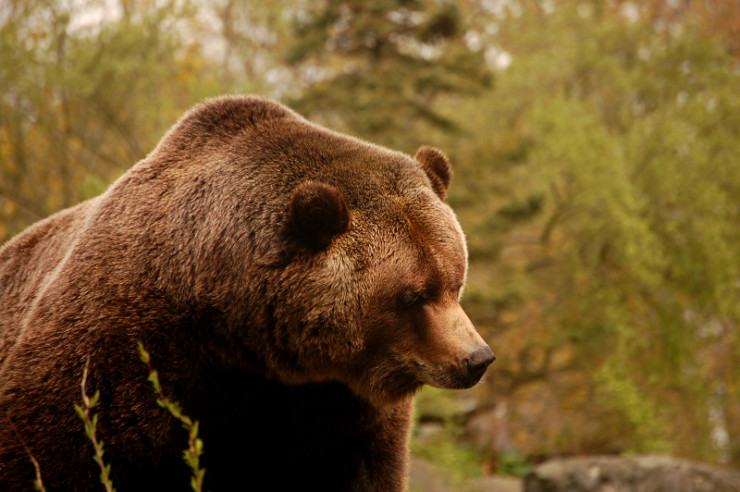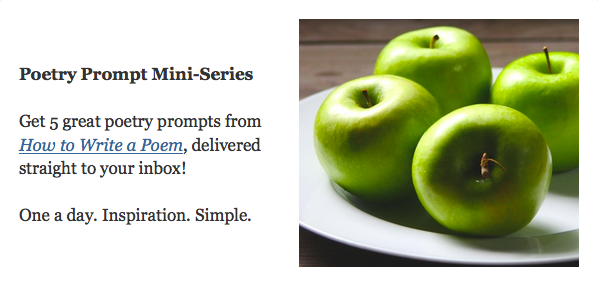
Prompt Guidelines and Options
1. Speak in the first person.
2. Be specific. Think nouns instead of adjectives.
3. Consider where you—a bear or a beast—are located, or where you came from, or where you are going. Or, speak as if you have a special desire or concern: maybe you are hungry, missing something, afraid of a sight or sound, in love with another beast that is like you or not like you (a bear falling in love with a honey bee!). Be creative. Any type of situation is fair game.
4. Consider doing a little research about the bear or the beast you will speak as: folklore, history, associated words, music, art, sculpture, architecture, fashion, science, constellations, and so on. Look for unusual details, so you can speak convincingly and intriguingly about yourself.
That’s it! We look forward to hearing you speak poetically, from the viewpoint of bears & beasts.
Click to get FREE 5-Prompt Mini-Series
Featured Poem
Thanks to everyone who participated in last week’s poetry prompt. Here is a reverse cinquain from Maureen we enjoyed:
Fall’s Leaves
Weary,
they slip to ground, their once-green skins —
now worn mottled coats — shed
in autumn’s own
dust-up.
Photo by Lauren Elyse Lynskey. Creative Commons via Flickr.
Browse more writing prompts
Browse poetry teaching resources

“How to Write a Poem is a classroom must-have.”
—Callie Feyen, English Teacher, Maryland
- Poetry Prompt: Misunderstood Lion - March 19, 2018
- Animate: Lions & Lambs Poetry Prompt - March 12, 2018
- Poetry Prompt: Behind the Velvet Rope - February 26, 2018

Katie says
I couldn’t seem to get anywhere with the animate approach – so tried a sort of catalog format:
Bears & Beasts
Bears, you say –
Like, lions and tigers and . . .
Beasts, you say –
Like, lions and tigers and. . .
Bears, you say –
Like beasts and bears and . . .
Beasts, you say –
Like bears and beasts and . . .
Oh, my – are you talking about
Wild animals?!
Oh, my – you DON’T SAY!
(maybe I should save my attempts for daylight hours when I’m not so punchy;)LOL
Heather Eure says
Katie, the fun you had writing this poem shines through. 🙂
Katie says
Thank you, Heather:)
I’m usually too serious so it felt good to be silly for a change!
Donna Falcone says
Oh fun! I enjoyed this too!
Katie says
Thanks, Donna:)
Doubt I’ll ever tire of word play!
Rick Maxson says
Catfish
My stillness unnerved them,
devouring sixty inches of their minds:
this was the mighty Muskingum,
its cataract, falling no further
than half a mile upstream.
A small hope, shared by many:
after the flood of ’50―they’d find me
moved. Yet, when a month of mud
cleared, I seemed longer and fatter than before,
near the dock where the cattails clatter.
Some swore through time, red-faced,
it was a keelhauled bow they saw,
something sunk and bogged down,
sucked-in so much the river that plucked
off seven bridges like steel flowers let it be.
Their swears evolved to dares for feats
and fears of wrestling with such a beast.
Wives were taxed for recipes of blood
and dough and meats, yet through years
of snarls and snells, they never saw me eat.
One morning I was gone, so fell their lore.
The mooring dried and shriveled,
wobbled on its legs, and stories,
shifted to the past like chum, to tell
of my return, and languid lingered:
their thoughts beyond the cast, not one for me:
how the river unseen sifted through my
solitary heart and why, one night,
as with elusive poems and dreams,
I raised my dorsal mast and drifted on.
L.L. Barkat says
I think what I like best here is the subtle internal rhyme of “swore,” “morning,” “lore,” “mooring,” and “stories,” which combine to give a kind of “oar” to the poem, driving it forward with that final internal rhyme “dorsal.” 🙂
Rick Maxson says
Thank you, LL. I hadn’t thought of the internal rhyme alluding to an “oar.” I appreciate that observation. It adds to the poem. One of the amazing qualities of poetry is what the reader brings to each piece. I intended the internal rhymes, those you noted and others, to move the poem along, as well as a vehicle for the reader to hear a word and reference back to its rhyme, similar to the way tales depend on those memories of particulars, true or imagined to be true.
My grandma Thirtyacre and her husband Fred Thirtyacre, a German immigrant, retired to McConnelsville, Ohio on the Muskingum River, not far from where it converged with the Ohio River. Off the dock next door was a catfish that people swore had ben there as far back as anyone could remember. It was 5’ long and never moved, never took a bait of any kind, dough balls, liver mash, chicken necks, Catfish Charlie’s bait, worms, crawfish etc. One morning, when I was 10 years old, I went down to take my Grandma’s boat out and there was a commotion at the next door dock. The catfish was gone, never to be seen again. There were a few who claimed they hooked it. Some said it pull their fishing gear in the water and ate it. There was a story of one man who noodled it and lost an arm. Some said it was a spirit that only appeared there in a cycle and would return, when the river was right for it. I’ve never cared if any of it was true. The fish was, because I saw it many times.
So it was easy to pretend I was that fish, and I liked that fish are not usually considered beasts, but big ones are.
L.L. Barkat says
Love all this background! 🙂 Mythic.
I never seem to intentionally do internal rhymes, but they are always there in my poetry (and my Sonia’s poetry). I love that you go about it intentionally, towards a certain purpose. I should write more poems again, and try it. 🙂
Heather Eure says
Ah, the unspoken hazards of noodling. Man, it would be cool to have a story about the ghost noodler who haunts the converging rivers looking for his arm.
Rick Maxson says
Oh, Heather! If you don’t write it, I will. What a great idea.
Donna Falcone says
I really appreciated this backstory and when I went back into the river after that beast, I saw it all more clearly… thank you. I love that line about when the mud cleared I seemed longer and fatter than before…. oh what a fish story!
Heather Eure says
This is an exciting poem! It was fun to discover (thanks, L.L.) the unintended internal rhyme.
Kaiya Rose says
Free
The moon is full, stars sparkle, shine
Reflected in the turn of time
Night brings the light in flaming boats
As howls escape our throats.
Our songs pierce through the quiet dark
Our minds surrender to our hearts
A wolf, a wind, one in the same
And like the winds, we are not tame.
We’re wild. We’re free. We’re meant to be
Under the sky among the trees
Dancing in the sighing breeze
With a bed of maple leaves
To rest our heads on when we tire
Revive us, calm our inner fire
Because we have what we desire
As wolves we are free.
Fun fact: I actually wrote part of the third stanza in fifth grade for a writing project.
Katie says
This is so beautiful, Kaiya Rose:)
Kaiya Rose says
Thank you, Katie!
Heather Eure says
How wonderful you were able to repurpose some of your earlier work, Kaiya. Wolves are an excellent choice for this prompt!
Kaiya Rose says
Thanks! I actually almost wrote about peacocks, but wolves sounded more beastly to me. 🙂
Donna Falcone says
I really enjoyed this, and it was wonderful to read aloud!
My favorite line was “And like the winds, we are not tame.”
Thank you so much for sharing your beast poem!
Kaiya Rose says
I’m glad you enjoyed it. Sometimes I feel like I use too many similes and metaphors. Its hard to choose which ones to use and which ones to throw away!
Maureen says
Thank you for sharing my autumnal cinquain.
Katie says
Hi again all:)
Kaiya’s mention of peacocks in one of her comments reminded me of a poem I wrote earlier this autumn:
The Prince of Andalusia
You spectacular bird
peafowl, peacock
makes no difference
where you flock
preening yourself
for all to see
right under our noses
pretty as you please
you strut and stride
‘cross the yard
with all that pride
for nothin’s too hard
when you’re plucky
and sprite
you always feel lucky
though never in flight
forward and backward
dancing, you go
backward and forward
surely and slow.